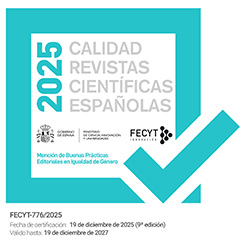Beauty and the Beast: Tracing Patriarchal Panopticism in Louise O’Neill’s Only Ever Yours
DOI:
https://doi.org/10.17561/grove.v31.8604Keywords:
panopticism, patriarchal society, control mechanisms, female objectification, beauty stereotypesAbstract
Only Ever Yours is a dystopian narrative underlining a feminist discourse that critiques the impractical obsessions of the masculine culture over the beauty standards of women. Set in an intensely regimented institutional structure in which young girls are tamed by an androcentric authority, the novel magnifies the gravity of patriarchal practices in reducing the status of women into mere objects by overemphasising their physical appearance and sensuality. This paper interrogates the living condition of the female characters that are subject to rigorous control mechanisms of the institution that seeks to mould them into ideal companions for young men adhering to patriarchal stereotypes. Drawing on Michel Foucault’s concept of ‘Panopticism’, this paper critically examines the representation of control structure in the select text, revealing its profound entrenchment of patriarchal ideologies. Moreover, it highlights the reciprocity between the panoptic system and the patriarchal gaze in enforcing a self-disciplinary inclination in women and examines its psychological repercussions on them.
Downloads
References
Bartky, Sandra Lee. “Foucault, Femininity, and the Modernisation of Patriarchal Power”, Routeledge, 2020, pp. 25-45, www.//faculty.uml.edu/kluis/42.101/Bartky_FoucaultFeminityandtheModernization.pdf . PDF file.
Berger, John. Ways of Seeing. British Broadcasting Corporation, 1972. Internet Archive. www.archive.org/details/WaysOfSeeingByJohnBerger
Braun, Heather. “Invisibility and (Dis)Embodiment in Louise O’Neill’s Only Ever Yours.” The Embodied Child: Readings in Children’s Literature and Culture, edited by. Roxanne Harde and Lydia Kokkola, Routledge, 2018, pp. 70-82. www.library.oapen.org/bitstream/handle/20.500.12657/49633/9781351588560.pdf?sequence=1#page=85
Elices, Juan F. “Othering Women in Contemporary Irish Dystopia: The Case of Louise O’Neill’s “Only Ever Yours”.” JSTOR, vol. 15, no. 1, 2016, pp. 73-86. https://www.jstor.org/stable/44363745?read-now=1&refreqid=excelsior%3Ac0143c878606ab02c193b6632cd32da4&seq=6#page_scan_tab_contents
Foucault, Michel. Discipline and Punish: The Birth of the Prison. Vintage Books. Translated by Alan Sheridan. 1975. Monoskop. www.monoskop.org/images/4/43/Foucault_Michel_Discipline_and_Punish_The_Birth_of_the_Prison_1977_1995.pdf . PDF file.
Heflick, Nathan A., and Jamie L. Goldenberg. “Seeing Eye to Body: The Literal Objectification of Women.” Current Directions in Psychological Science, vol. 23, no. 3, 2014, pp. 225–29. JSTOR, /www.jstor.org/stable/44318776.
Naufina, Nurin. “The Portrayal of Hegemony and Patriarchy in Louise O’ Neill’s Only Ever Yours.” Pioneer: Journal of Language and Literature, 2021, vol. 13, no. 2. https://doi.org/10.36841/pioneer.v13i2.1215
Neagu, Alexandra. “Body Image: A Theoretical Framework.” The Publishing House of Romanian Academy, 2015, 29-38. https://acad.ro/sectii2002/proceedingsChemistry/doc2015-1/Art04Neagu.pdf
O’Neill, Louise. Only Ever Yours. Quercus, 2014.
Sabala, and Meena Gopal. “Body, Gender and Sexuality: Politics of Being and Belonging.” Economic and Political Weekly, vol. 45, no. 17, 2010, pp. 43–51. JSTOR, www.jstor.org/stable/25664384.
Wright, Amelia Clare. “The Panopticon of the Patriarchy.” vocal.media. www.vocal.media/viva/the-panopticon-of-the-patriarchy
Wrobel, Claire. “Introduction: Literary and Critical Approaches to Panopticism.” Revue d’études benthamiennes, 30 Jul. 2022, pp. 1-19, Open Edition Journals, www.journals.openedition.org/etudes-benthamiennes/9920
Published
Issue
Section
License
Copyright (c) 2024 P. Shubha, S. Christina Rebecca

This work is licensed under a Creative Commons Attribution 4.0 International License.
Authors who publish with this journal agree to retain copyright and grant the journal right of first publication with the work simultaneously licensed under a Creative Commons Attribution License that allows others to share the work with an acknowledgement of the work's authorship and initial publication in this journal. Also, authors will retain the rights on their work, even if they will be granting The Grove. Working Papers on English Studies a non-exclusive right of use to reproduce, edit, distribute, publicly communicate and show their work. Therefore, authors are free to engage in additional, independent contracts for non-exclusive distribution of the works published in this journal (such as uploading them to an institutional repository or publishing them in a book), as long as the fact that the manuscripts were first published in this journal is acknowledged.

























